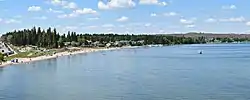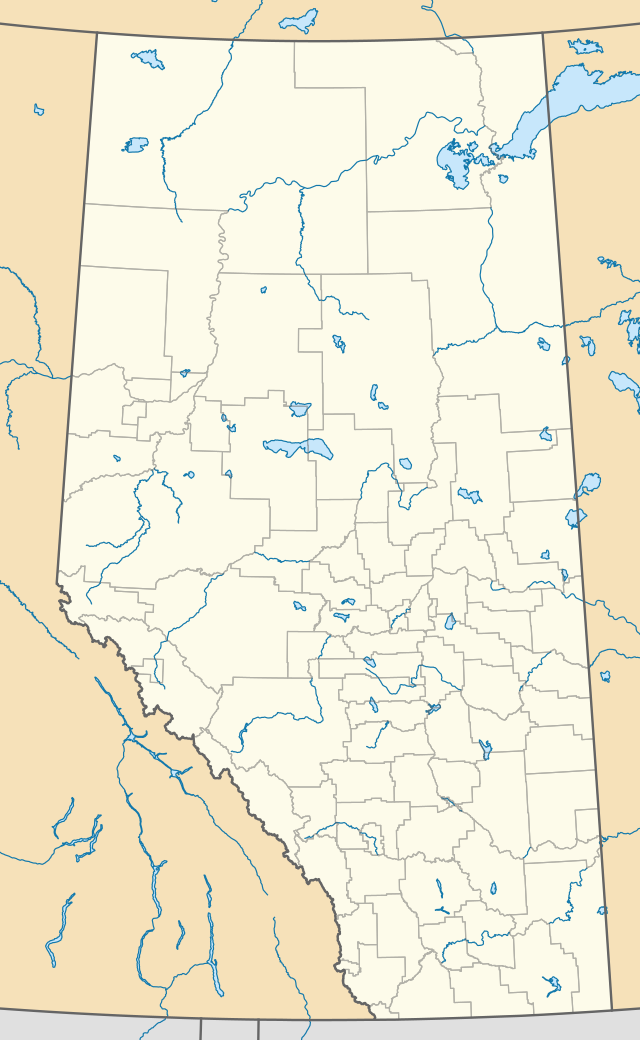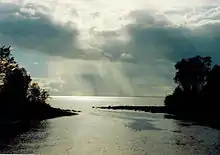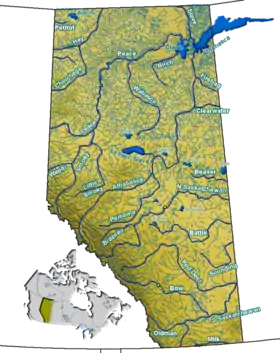Cold Lake (Alberta)
Cold Lake is a large lake in Central Alberta and Northern Saskatchewan, Canada. The lake straddles the Alberta/Saskatchewan border, and has a water area of 373 km2 (144 sq mi). It is also one of the deepest lakes in Alberta with a maximum depth of 99.1 m (325 ft). It has around 24 known species of fish in it and is a major ice fishing lake. It is also major stop for many migrating birds, and is home to one of the largest warbler populations in Alberta.[1] A surface of 248 km2 (96 sq mi) lies in the province of Alberta.
| Cold Lake | |
|---|---|
 Kinosoo Beach on the edge of Cold Lake. | |
 Cold Lake | |
| Location | Bonnyville No. 87, Alberta / Beaver River No. 622, Saskatchewan |
| Coordinates | 54°33′N 110°03′W |
| Type | Mesotrophic |
| Primary inflows | Martineau River, Medley River |
| Primary outflows | Cold River (Saskatchewan) |
| Catchment area | 6,140 km2 (2,371 sq mi)[1] |
| Basin countries | Canada |
| Surface area | 373 km2 (144 sq mi)[1] |
| Average depth | 49.9 m (163.7 ft)[1] |
| Max. depth | 99.1 m (325.1 ft)[1] |
| Surface elevation | 535 m (1,755 ft)[1] |
| Islands | Murray Island |
| Settlements | City of Cold Lake |

The city of Cold Lake is located on the shore. Excepting the western shore, the lake is surrounded by protected areas such as the Cold Lake Provincial Park in Alberta and the Meadow Lake Provincial Park in Saskatchewan. The Cold Lake 149 A and B indian reserve of the Cold Lake First Nations are established on the western and southern shores respectively. Cold Lake House was a trading post built by the Montreal traders in 1781 near the present Beaver Crossing, Alberta south of Cold Lake.
The Martineau River flows from Primrose Lake into Cold Lake, which in turn discharges through the Cold River (Saskatchewan) in Waterhen River (Saskatchewan), a major tributary of Beaver River.
Fish species

Fish species include walleye, sauger, yellow perch, northern pike, lake trout, lake whitefish, cisco, burbot, white sucker and longnose sucker. Both Alberta and Saskatchewan angling licenses are valid on the entire lake.
References
- Atlas of Alberta Lakes. "Cold Lake". Archived from the original on 2011-09-28. Retrieved 2008-01-03.
- Fish Species of Saskatchewan
- Meadow Lake Provincial Park
- http://gateway.ca.gov.ab.ca/siteinformation.aspx?id=22%5B%5D
